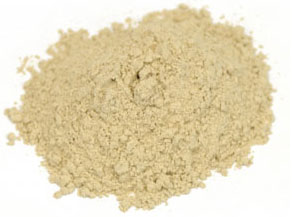 Ginseng Panax Powder.
Ginseng Panax Powder.
Ginseng Panax is a plant native to the Asian continent - it grows predominantly in Korea, north-eastern China and eastern Siberia.
Asian people have been using ginseng as an elixir of health for hundreds of years. It is believed to extend longevity as well as fight stress and relieve tiredness and fatigue, among numerous other benefits. (Ref. 1 and 2)
This wonderful gentle energiser may help us gain more mental clarity and healthier physical state - picking us up and carrying us through the most demanding times. (Ref. 3)
This energising effect is partially achieved thanks to the fact that ginseng is a well-known adaptogen. Adaptogens regulate the body's metabolic functions to better adapt it to external and internal stresses and bring the system back into balance. (Ref. 1)
In this respect, ginseng is very useful indeed for those who cannot tolerate coffee or any artificial *energy* drinks.
Many of ginseng's health-boosting properties (incl. its adaptogenic ones) are attributed to the work of complex steroid-type chemicals called ginsenosides.
Ginsenosides have been shown to produce anti-oxidant, anti-inflammatory and cancer-fighting effects, as well as positive effects on the central nervous system. (Ref. 4 and 3)
Ginseng is also used as an aphrodisiac, and to treat male sexual dysfunction. (Ref. 5)
There are many "energy supplements" on the market which use ginseng as one of their active ingredients.
But why not take the pure product instead and avoid all the chemical additives which are commonly present in artificially synthesized supplements?
Ginseng is not recommended for pregnant women.
Always consult a nutritional therapist if you are planning to take ginseng to treat any medical condition.
Written by: Irina Bright
Original publication date: 2013
Updates: 2020
Republication date: 2020
References.
1. Kim DH (2012). Chemical Diversity of Panax ginseng, Panax quinquifolium, and Panax notoginseng. Published in Journal of ginseng research. Retrieved June 1, 2013 from: https://www.ncbi.nlm.nih.gov/pubmed/23717099
2. Kim HG, Cho JH, Yoo SR, Lee JS, Han JM, Lee NH, Ahn YC, Son CG (2013). Antifatigue Effects of Panax ginseng C.A. Meyer: A Randomised, Double-Blind, Placebo-Controlled Trial. Published in PLoS One. Retrieved June 1, 2013 from: https://www.ncbi.nlm.nih.gov/pubmed/23613825
3. Sergiy Oliynyk and Seikwan Oh (2013). Actoprotective effect of ginseng: improving mental and physical performance. Published in Journal of Ginseng Research. Retrieved June 1, 2013 from: https://www.ncbi.nlm.nih.gov/pmc/articles/PMC3659633/
4. Dong-Hyun Kim (2012). Chemical Diversity of Panax ginseng, Panax quinquifolium, and Panax notoginseng. Published in Journal of Ginseng Research. Retrieved June 1, 2013 from: https://www.ncbi.nlm.nih.gov/pmc/articles/PMC3659563/
5. Lee Jia, Yuqing Zhao, and Xing-Jie Liang (2009). Current Evaluation of the Millennium Phytomedicine- Ginseng (II): Collected Chemical Entities, Modern Pharmacology, and Clinical Applications Emanated from Traditional Chinese Medicine. Published in Current Medicinal Chemistry. Retrieved June 1, 2013 from: https://www.ncbi.nlm.nih.gov/pmc/articles/PMC2754208/